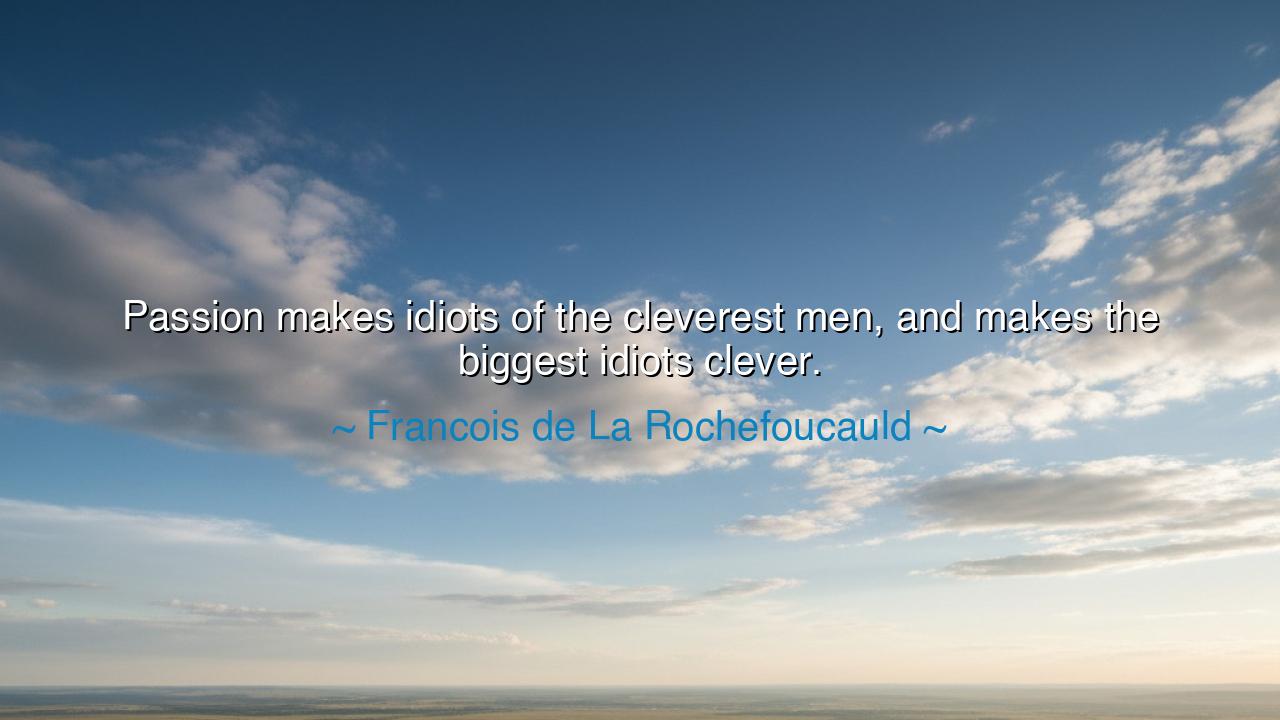
Passion makes idiots of the cleverest men, and makes the biggest






The words of François de La Rochefoucauld pierce like a double-edged blade: “Passion makes idiots of the cleverest men, and makes the biggest idiots clever.” In this aphorism, the great French moralist unmasks the raw power of passion, that fire of the soul which does not bow to intellect, nor to reason, nor to station. Passion, in its fury, can reduce the wise to folly and yet, with equal force, lift the fool into moments of brilliance. It is both the curse and the crown of mankind, the storm that can wreck the ship or drive it faster than any wind.
The origin of this saying lies in the courtly world of seventeenth-century France, where La Rochefoucauld observed with cold clarity the intrigues of lovers, the ambitions of courtiers, and the downfall of men who thought themselves untouchable. He saw how generals lost wars for love, how princes betrayed reason for desire, and how humble men, often scorned as fools, found sudden eloquence or courage when ignited by passion. From these observations came his Maximes, short, sharp lessons carved from the contradictions of human nature.
The ancients knew well the truth of this paradox. Consider the tale of Antony, mighty Roman general, who commanded armies and held empires in his grasp. In wisdom and skill he was unmatched, yet passion for Cleopatra made him reckless. Strategy gave way to indulgence, and Rome’s greatest soldier became a lover undone. His brilliance collapsed into folly, and through him the world itself was reshaped. Here we see La Rochefoucauld’s truth: even the cleverest are made fools when the flame of desire consumes their judgment.
And yet, passion can exalt the lowly. Think of Joan of Arc, an unlearned peasant girl, mocked by the wise of her age. But her heart burned with the fire of vision and faith, and in that flame, the “idiot” became a leader of men, a voice that rallied a nation, a symbol that endures for centuries. Her passion gave her a wisdom no schooling could grant, and in this she became living proof that the most ordinary soul can shine with unexpected brilliance when lit by conviction.
This is the dual nature of passion: it destroys and it creates, it blinds and it illuminates. To deny it altogether is to live a bloodless life, without courage, love, or fire. Yet to be enslaved by it is to invite ruin, for ungoverned passion drags the clever down into the same pit as the fool. Thus the wisdom of La Rochefoucauld is not merely to observe the paradox, but to warn us: passion is not the enemy, but it must be mastered, lest it master us.
The lesson for us is clear: beware when passion seizes you, for in that moment your cleverness may falter. Step back, breathe, test your desires against reason before you act. But also do not despise passion, for it is the spark that drives creation, art, and courage. Learn instead to be its master—to harness its fire without being consumed. Let it be the horse you ride, not the beast that drags you to destruction.
Practical action lies within reach: when your heart burns with desire, ask yourself—does this flame light the path forward, or does it blind me? When you feel no fire at all, seek what awakens your soul, for without passion, life becomes a gray desert. Balance both: the wisdom of reason and the fire of passion. Together, they forge greatness.
So let us carry La Rochefoucauld’s wisdom as a torch: passion makes idiots of the cleverest men, and the biggest idiots clever. Do not despise this paradox, but embrace it as a truth of the human condition. For within it lies the reminder that we are creatures of both fire and mind, and only when both are tempered together do we become whole, powerful, and truly wise.






AAdministratorAdministrator
Welcome, honored guests. Please leave a comment, we will respond soon